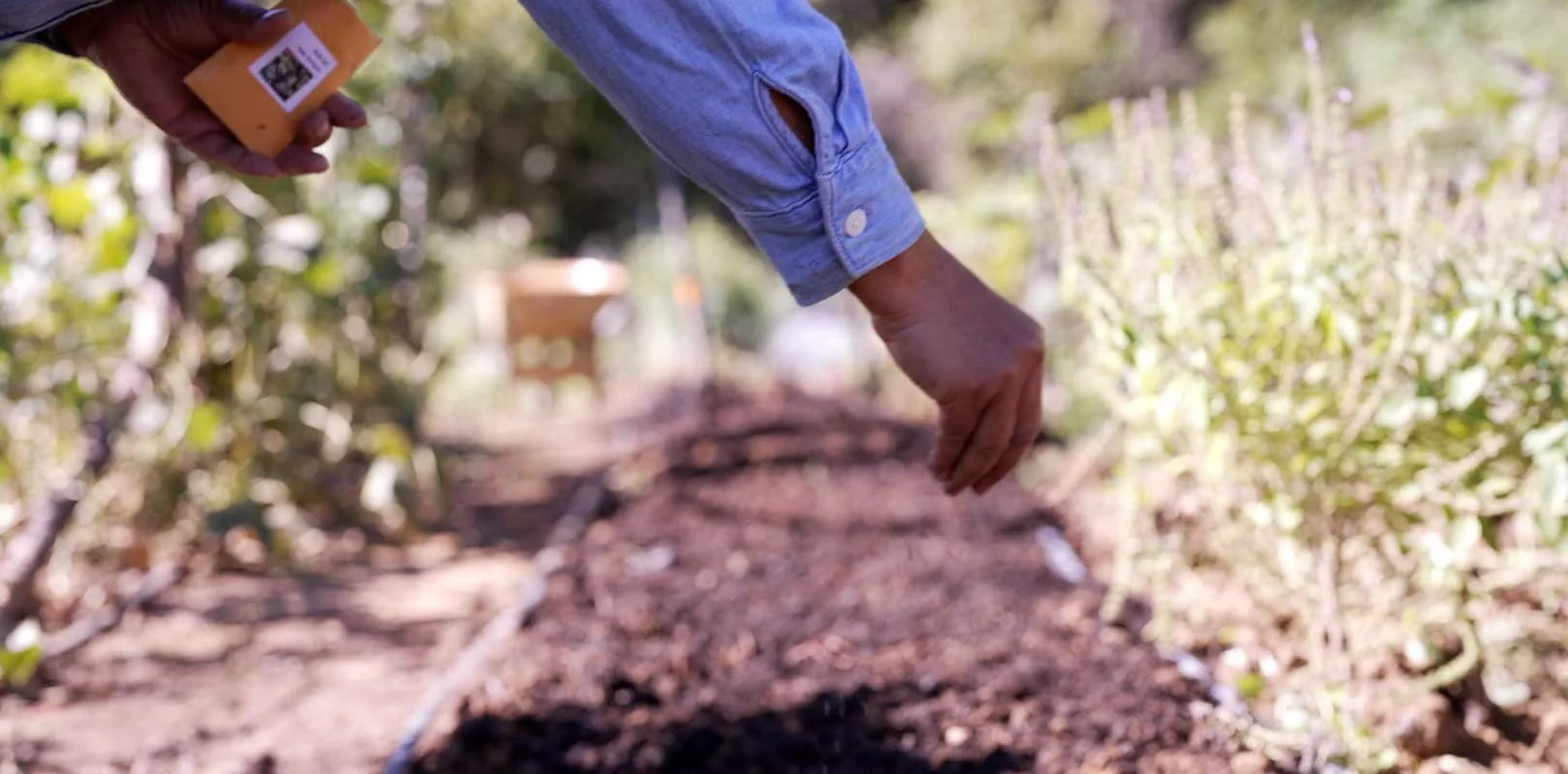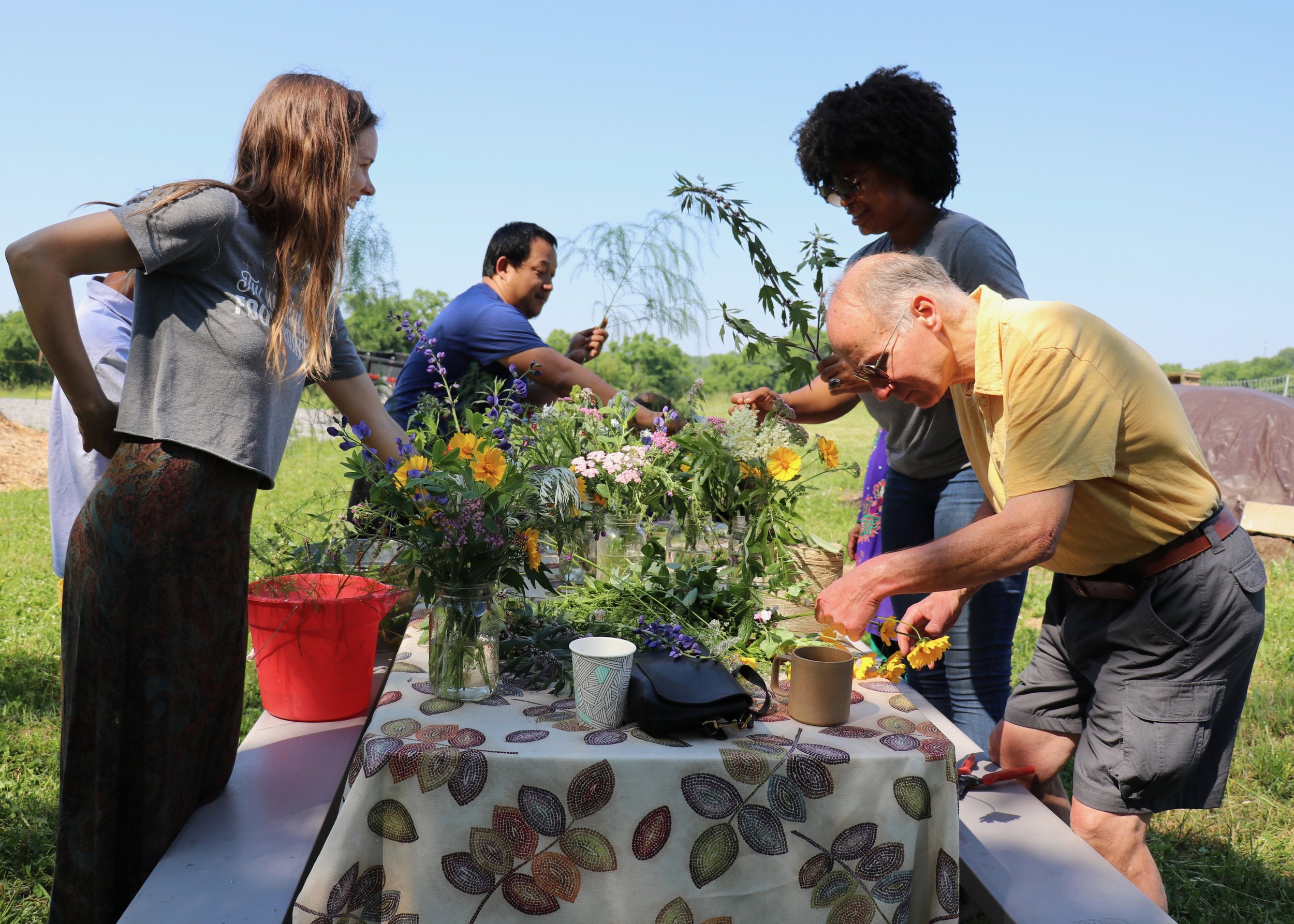Garden Stories
Now in its fifteenth growing season, McGruder Community Garden is a space where people from all walks of life gather to find connection, learn from one another, and grow food for themselves and their communities. The garden includes several colorful raised garden beds, a pollinator garden full of fresh flowers, and a small orchard of fruit trees, and is lovingly tended by community members in partnership with The Nashville Food Project. Recently, a team helped us install 12 more raised beds, expanding our production capacity by 50 percent.
Can you imagine 27,000 pounds of produce? Now picture that being grown by the patient hands of just four families on less than a single acre of land. This is the work of Growing Together, an urban farm in southeast Nashville jointly stewarded by immigrant and refugee farmers and The Nashville Food Project.
When banjoist, songwriter, journalist and activist Justin Hiltner recorded a set at our headquarters for the upcoming 10th Anniversary Picnic Party, he took a minute to introduce a new song about “anxiety and growing Old Tennessee melons, called Muskmelons.”
A whole song about growing melons? We were obviously smitten.
To say we have loved working with Justin for this event would be an understatement. Learn more about him below, and don’t miss the streamed show, which will air Sunday, September 26!
Growing Together Manager Tallahassee May writes about the farmers’ produce-sharing partnership with Tennessee Immigrant and Refugee Rights Coalition.
“In growing food for local sales and distribution, [the farmers] have the autonomy to grow food that is both culturally meaningful to them as well as crops that support relationship-building with different cultures.”
We spotlight Elmahaba Center, a nonprofit serving the Arabic-speaking community, as well Ashraf Azer, interpreter for the Arabic-speaking gardeners at the Community Farm at Mill Ridge. We are privileged to host seven Egyptian gardeners on the farm this season and have loved learning about a specific type of green used to make Molokhia, a beloved Egyptian soup.
The Nashville Food Project stewards a portion of Mill Ridge Park as the Community Farm at Mill Ridge, as space that currently hosts about 80 community garden participant families. Our partnership with Friends of Mill Ridge Park (FMRP) has been essential in the continued success of TNFP’s efforts to create infrastructure and land access opportunities for folks to grow their own food in the South East Nashville area. As we celebrate the ways that our work is intertwined with other types of environmental justice work in Nashville, we spoke with FMRP Executive Director, Darrell Hawks.
The Nashville Food Project garden spaces have long been witness to the wisdom, hope and joy of growers who came to the United States from Southeast Asia. We also have been witness to their added hardships and concerns this past year including anti-Asian violence here. and abroad.
Director of Garden Programs Lauren Bailey writes about the countless and often unseen hands in our food system. She challenges us to consider the larger web we exist in by acknowledging and learning from food workers as we work toward a better food system.
Let us first remember the trees.
If you can imagine 1,000 years ago, to when this hillside and all that our eyes could see was covered in a vast forest of maple, oak, chestnut, and hickory. A squirrel could travel for miles without touching the ground.
Over the years, we’ve witnessed the benefits of community gardens firsthand. Participants tell us they experience improved physical and mental health as well as a stronger sense of belonging.
But in addition to participants in our own programs, we also hear from folks who want to start community gardens of their own. If you’re interested in assembling a group and inspiring change, as we are, then here are a few good places to start:
After a decade of cultivating nourishing food and community in this space, we will be relocating our Wedgewood Urban Garden. We have known that this transition would come as our programming and needs have grown and evolved, and we leave the space with so much gratitude for what it is and what it has become.
As I sit down to write this post, I keep thinking about the cycles that come with gardening. The ebb and flow of planning, planting, tending and harvesting. And just like planting a garden, our work is cyclical…
Siddi Rimal has tended a community garden plot and worked as a Nepali-to-English translator with The Nashville Food Project’s urban agriculture program for five years. Like many of the community gardeners and all the farmers in Growing Together, he came to the United States as a refugee…
With market season well underway, the Growing Together farmers are busy harvesting, washing and packing their crops for restaurants and markets, as well as preparing for their fall CSA and a new September partnership with MEEL, a local online marketplace and farmstand…
July in Tennessee can be a tough time to stay motivated to get outside and face what seems like an endless wave of weeds, bugs, and humidity. But season after season, you may find yourself being drawn back in. How do you stay motivated to keep gardening? We asked our staff to share their tips and advice on staying inspired and active in their own gardens.
Since last fall, we’ve been busy breaking ground and building infrastructure at our newest garden site in southeast Nashville - the Community Farm at Mill Ridge Park. Located in Metro Nashville's newest regional park, this community farm will be a new home to TNFP garden programs. So much planning, love and work has already been poured into this project, and we were incredibly excited to celebrate with a grand opening of the farm on Saturday!
It’s a beautiful spring day, and neighbors are gathering for garden workshop at the Wedgewood Urban Garden, an urban oasis tucked off of Wedgewood Avenue near the Tennessee State Fairgrounds. Today, we’re learning about garden pests. Whether it’s aphids or caterpillar worms, many gardeners can relate to pest problems. At TNFP gardens, we’re using and encouraging an approach to natural pest control called Integrated Pest Management…
Since gardeners and farmers growing in many spaces can utilize and benefit from starting seeds indoors, we thought we’d share some of the tips and tricks the Growing Together farmers and staff of The Nashville Food Project use to grow the healthiest transplants!



















There’s something to be said for things that grow steadily over time — like a well-tended garden. And just like the garden requires patience, care, and dedication to show up again and again, so do partnerships that create lasting change. For the last three years, Love, Tito’s, the philanthropic heart of Tito’s Handmade Vodka, has supported The Nashville Food Project as part of their Block to Block program.